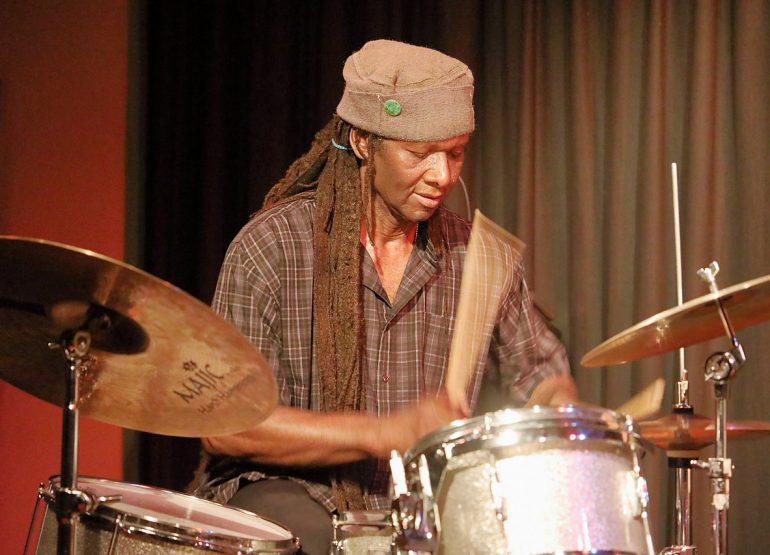The drummer, who is not only the core of the rhythm section, but also attracts attention as a perfect solo instrumentalist is a rarity. In the 90s he was hailed as the best improvising drummer in the world. Hamid Drake is a special artist. Considered by many to be one of the greatest drummers of his time, he intensively performs and records with not only such veterans of the freejazz world as Peter Brotzmann, William Parker, Matthew Shipp, Michael Zerang, or Ned Rothenberg.
Hamid Drake is an American drummer from Africa. He is renowned for playing not only the basic jazz set, but also various ethnic percussions, characteristic of Asia and Africa. Combining elements of world music with wild improvisations, he gained sympathy and respect in the circles of fanatics of rhythmic ethno and jazz improvisation. The apogee of Hamid Drake’s career, if the word apogee can be used in such a turbulent and multi-directional musical activity, comes from the 1990s, when he stormed the improvised scene thanks to his cooperation with Peter Brotzmann, Fred Anderson and Michael Zerang. Until then, he had played with Fred Anderson many times before. It was the saxophonist who introduced young Hamid to the world of Chicago’s AACM (Association for the Advancement of Creative Musicians). An organization of black freejazzmen, whose influence in the drummer’s playing, despite the passage of forty years can be found to this day.
Hamid Drake’s acquaintance with Fred Anderson was well cemented from the very beginning of their common musical history. Hamid Drake studied with his son Fred Anderson and was introduced to his father, who very quickly found a common ground with him. After a short time, Drake replaced his son Andersson in the band of the famous saxophonist. Since the album Another Place, 1978, Fred Anderson’s quintet, the two musicians’ jazz routes have been closely intertwined. The continuity of this cooperation is confirmed by the albums released at the end of Anderson’s life: From the River to the Ocean (2007), Willisau & Taktlos, (2007).
The collaboration with Fred Anderson has had a significant impact on the drummer’s later achievements. Hamid Drake, with time he became a leader himself, started to organize his own line-ups and various projetas. Particularly noteworthy are the numerous duets with his participation. The most famous of them is the drum duo in Michael Zerang, with whom he recorded albums such as Ask The Sun, 1997, or newly released tribute – For Ed Blackwell, 2016. Hamid Drake has also performed and recorded with ultra-chamber musicians such as Joe McPhee, Jeb Bishop and William Parker.
But it wasn’t only the American improvisation scene that caught the attention of Hamid Drake. Also in Europe, he found fellows worthy of his extensive fantasy and unusual compositional ideas. One of the favourite musicians of the old continent is Peter Brotzmann for Hamid Drake. Over the years, the gentlemen have listened to each other in many ways. They played together in a duo (The Dried Rat Dog, 1995), a trio (with pianist Marilyn Crisspell – Hyperion, 1995, or William Parker – Never Too Late, But Always Too Early, 2003), a quartet (Die Like A Dog), and even a tentettoo led by Peter Brotzmann.
Taking into account the above mentioned collaborations of Hamid Drake, it is not difficult to notice that the drummer feels best in the company of improvising freaks. The Indigo trio is another band with Hamid Drake at its core. This time it is accompanied by flutist Nicole Mitchell and one of the most popular masters of Chicago’s avant-garde double bass player Harrsion Bankhead. This chamber ensemble has released such gems as the album Anaya, 2007, recorded in the basic line-up of the trio, and Ethopian Princess Meets Tantric Priest, with the participation of a special guest – Michel Edelin from France.
In his career Hamid Drake has also established cooperation with the younger generation of free jazz from Chicago. Together with Kent Kessler (saxophone) and Ken Vandermark (double bass), Hamid Drake performs under the banner of the DKV Trio. In Poland, DKV performed for many years both in the times when it was not yet a very famous band, as well as in the times when it became a legend, including the Krakow Jazz Autumn 2012, and also in Poznan, at one of the three concerts in Europe during the then tour, in 2015. During their not so frequent performances, although two excellent boxes containing concert recordings released by Not Two Records may contradict this, they accumulate, as many people say, innovative ideas for improvisation in a small line-up, but above all, great energy and momentum of the composed band’s idolatry.
Hamid Drake is mainly associated with the free current, although when he leads his own bands, these freejazz inclinations weaken anything, but his achievements far exceed the attribution to one and the same band.

